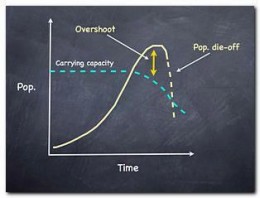Have we reached the maximum human population carrying capacity?
Have we reached the maximum human population carrying capacity?
If you refer to the picture, this can be observed when viewing population of bacteria growing in a petri dish. If Earth is the petri dish, where do you think humans are on this chart? Is our population about to crash?

From what I've read recently, we exceeded the carrying capacity some time ago but there are many opposing views on the subject. Apparently it's a difficult thing to assess.
As someone born in the late 1950s, I'm amazed that world population has tripled since I was born and my personal view is that there are just too many of us and we've already damaged the environment too much for it to be sustainable.
Nothing is infinite and we must also consider that it's not just humans that populate this planet. There has to be habitat for other animals too. I've written an article about overpopulation which you might like to read on HubPages. It's called: 'Are there too many people in the world?'Some people think that technology will save us. As we become more advanced, technology will solve all of our problems. However, I disagree with this because I do not think technology will evolve fast enough. What do you think?
I don't think technology can save us because however advanced it becomes, the natural world can't keep up with the decimation of habitats and the depletion of natural resources. We're driving over 200 species a day to extinction!
A follow up question to this is if the population is too large, how would you lower it? Essentially, you need 2.1 kids or less per family to maintain & probably 1.5 kids to reduce an overshoot. Also, there is an unknown of future life span.
Daniel, lowering population is something every fertile person on the planet needs to address. Programs should be purely voluntary or some government incentive given. I've written an article on here called: 'Are there too many people in the world?'
Stella. I checked out your hub. Thanks for writing! I offered some more questions on it. I think there's a consensus that pop. capacity is worrisome in this thread. What I'm interested is what do you see as the sol. to push for & the ethical boun
I don't know the answer but I suspect that there are too many people on the planet for the limited natural resources to sustain population growth.
Basically, this will happen to us without a doubt at some point. It's just a matter of when. But does our intelligence help us escape this inevitable doom?
Kyle, as long as there are vested interests in carbon fuels, which will run out at some point, and which anyway contribute to planetary warming,profit and the immediate need for jobs trumps (excuse pun) intelligence, apparently.
Kyle, our intelligence won't help and it'll happen sooner than you think. See the works of Guy Mcpherson... he says we have less then 10 years before we go extinct. This may seem far fetched but all the facts are there to back up his claims.
- Daniel Gottlobposted 8 years ago
0
I've seen it shown that we might be at that capacity currently (Yale e360) or at 10 Billion (Oxfam). It is hard to gauge when we'll hit the Malthusian trap & since the Industrial Revolution & probably before, there have been predictions that we are at capacity.
I think we are probably close to carrying capacity for the current technology being used & there is cause to think about what we are setting the next generations up for.
On one end, with the increasing volatility of weather it becomes exceeding more difficult to bring food staple crops to maturity & we are quickly expanding to the extents of available arable land. Also, water scarcity is huge issue issue now ranging from groundwater aquifers being depleted way ahead of their recharge rates to surface water being reduced to streams across the globe. Plus, how much of it is becoming unsuitable to drink due to pollution? Lastly, energy plays a key role as well and is tied to the two.
I don't think you can look at things in a static manner. The items above are extremely troubling if we don't curb population growth or come up with answers to shift the carrying capacity.
For food, there are various levers to pull from diet changes to things that are less water/land intensive (i.e less meat, less almonds, etc). Plus, what if we could convert non-arable land into arable land or the oceans? There are several efforts currently looking at both. While, industrial fertilizer warrants scrutiny and has unintended consequences, the production of ammonia fertilizers has also enabled some the yields we see now and shifted the carrying capacity. The lack of fertilizer is part of why the U.S. wanted the Virgin Islands from Spain. Read up on the Guano Islands Act in the 1850's as it is pretty interesting.
For water, there is a lot of work right now in reverse osmosis to pull water from oceans. Saudi Arabia currently uses desalination but it is very energy intensive and there are still some gains to be made on irrigation (aquaponics, etc).
For energy, I think it is pretty clear how much the market continues to evolve and shift as new and better technologies become available.
Overall, there are a lot of constraints that get are butting up against and efforts that can help push those constraints. It is hard to gauge what that limit is, which should give us pause. Ultimately, if we can't stay ahead of the growth; the overshoot is going to devastating in the outfall. 
The petri dish analogy would indicate the Earth is a planned experiment within closed boundaries. That earth is a petri dish for aliens and that humans are raised for spare parts or food. Perhaps the Rapture is the Round Up.
Git along lil' doggies ...
Back in the 1970s people were worried about the "population boom". It's doubtful many people are losing sleep over this issue these days.
Actually population growth has been slowing down for decades.
Better birth control methods, women going to college and establishing careers, legalized abortion, and economics have caused couples to have fewer children on average.
In the U.S. the birthrate has dropped so much that people are worried about maintaining our Social Security system to provide for the "Baby Boomers". Simply put there are not enough younger people to pay into the system to maintain it as it is.
Granted there are some countries that ARE overpopulated such as China and India but by and large there are millions of acres of land around the world which could accommodate a larger population. However death is always a certainty that will offset some new births.
Mankind has demonstrated over thousands of years that it is intelligent, creative, resilient and adaptable.
We're the only species on earth with the capacity to change our environment. We can create light in darkness, communicate with one another around the globe, keep homes cool in blistering hot summers or warm during bitter winters.
We can fly higher and further than any bird dare dream, we've even been to the moon and back! We're heading to Mars!
We've created cures and medications for diseases along with organ transplants. We can turn salt water into drinking water.
I have no doubt mankind will find a way to not only survive but thrive in the future. Our only limitation is our imagination.As you correctly say, mankind has achieved so much - but at the expense of all other life-forms.Habitats are being destroyed at an alarming rate, so as human-induced climate change takes hold, mankind will go extinct - a victim of its own success.
It's possible that new species evolve or mankind will find ways to keep certain animals from becoming extinct. Thankfully mankind wasn't around w/dinosaurs or we'd be blamed for their extinction. Efforts are being made to address climate change
Climate change is irrevocable. New species take time to evolve and can't do so if habitat disappears. Existing species can't adapt if the planet gets too hot too fast which it will. We can't stop animals from going extinct when we steal their habitat

Yes, the earth has reached its maximum population capacity. However, in industrialized & post-industrialized, computerized nations, the birth rate has dropped significantly. In such nations, small families of 1-2 children are the norm. It isn't unusual for affluent & educated people to have low birth rates because they know the connection of family size to education & socioeconomic class. Family size in affluent & educated households are getting even smaller w/the increase of 1-child families.
However, among the lower classes, one will find the most prolific reproduction. Poor people have THE MOST children because they either have very little/no access to contraceptive methods, they have been subjected to STRONG religious inculcations against birth control, or they really could care less about birth control-they DO WHAT FEELS GOOD & WHAT THEY WANT. Poor people are also the LEAST EDUCATED people. Least educated people have the most children or children they can ill afford. In poor countries, population capacity is beyond the maximum level which explains the dire poverty of such countries.
The remedy is education. As people become more educated, they become more affluent & thus these components are highly influential in family size reduction that these parents want to provide their children a life beyond the bare rudiments. Affluent & educated people tend to have small families because they want to provide a high & cultivated standard of living. Poor & less education tend to have large families &/or children they can't afford because they do not have the cognizance of or access to birth control. There is the respective culture of the poor who view things as happenstance while the affluent strategize & achieve things.
Related Discussions
- 14
What evidence would tell us if human population has exceeded the Earth's carryin
by Jim Miller 11 years ago
What evidence would tell us if human population has exceeded the Earth's carrying capacity?Earth's human population currently stands at 7 billion and is on target to double in 70 years. Clearly, it seems, at some point human population will be greater than the planet's resources--food, clean water,...
- 2
How can the world's population be kept down at carrying capacity?
by andrew savage 11 years ago
How can the world's population be kept down at carrying capacity?Depsite that some may postulate that we need an overpopulated planet to afford inexpensive labor, let us presume that overpopulation is destabilizing the ecology of the biosphere and international economy. How then are we to keep...
- 24
After the Coming Human Reduction....
by qwark 14 years ago
.... will manking be reduced to "Eloi and Morlocks?"
- 51
What do rats do when there are too many in the cage?
by qwark 13 years ago
Can anyone relate this question, intellectually, to the contemporary "human condition?" Explain why you can or cannot.Qwark
- 13
What is the best way to lower the world's human population to 500 million and ke
by andrew savage 12 years ago
What is the best way to lower the world's human population to 500 million and keep it that way?
- 11
Evolution
by poleflux 14 years ago
The future state of man as we know him today is about to evolve into what he is today. If you believe in evolution then by design our world is about to change. Change how? Well we are surrounded by beautiful trees, streams, forests and stars to name a few sights. We all love...












